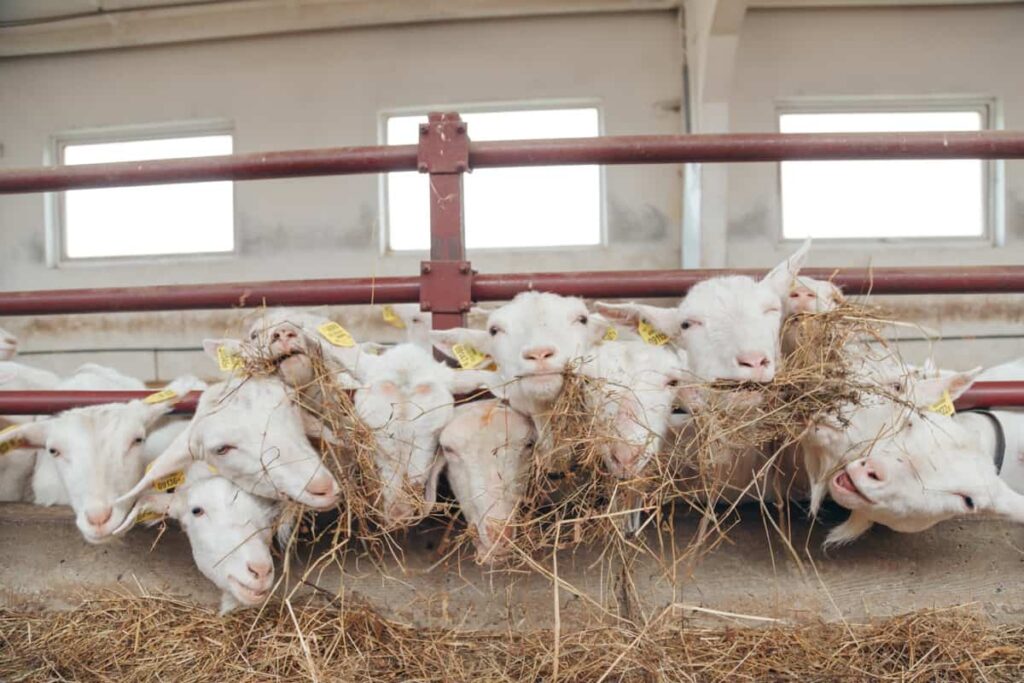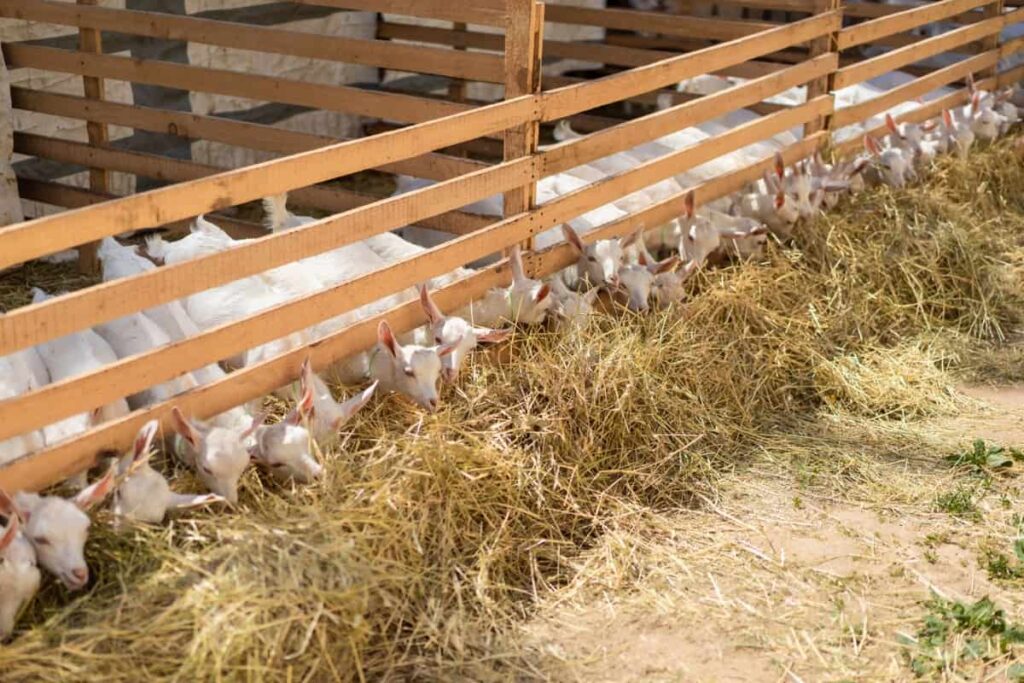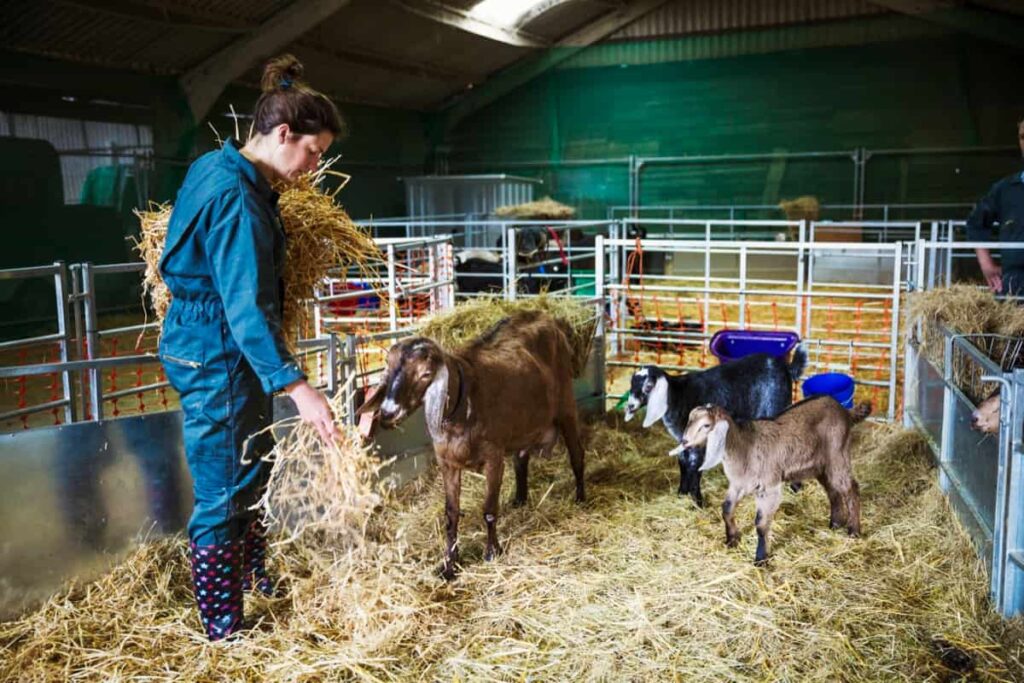Goat fodder, also known as goat feed or goat forage, plays a vital role in goats’ overall health and well-being. Fodder production ensures healthy growth and optimal productivity for your goats. Deciding on the right type of goat fodder depends on various factors, including availability, cost-effectiveness, nutritional value, climate conditions, and individual goat preferences. Experimenting with different types of fodders is important to find what works best for your herd.

Goat Fodder Information
What is Goat Fodder?
Goat fodder refers to the food and plants given to goats as their primary source of nutrition. It is a vital component in their diet, providing them with essential nutrients, vitamins, and minerals for growth and overall health. Remember that proper feeding practices should always be followed when offering goat fodder. Ensure fresh water supply and monitor feed intake based on body weight guidelines provided by experts or veterinarians.
Which Fodder Is Best for Goats?
Choosing the right fodder for your goats is essential to their health and well-being. Goats enjoy common green forages such as Lucerne, Berseem, Napier Grass, and Cowpea. These options provide a good source of nutrition and can be incorporated into a diet.
Tips for Feeding Goats
It’s important to remember that each goat is different, so their specific dietary needs may vary. One important tip is to provide various fodder options for your goats. This will help meet their nutritional needs and keep them interested in eating. Some good options include lucerne, Napier grass, cowpea, and tamarind.
Another tip is to ensure your fodder is fresh and free from mold or contamination. Goats can be picky eaters and may refuse food that doesn’t meet their standards. It’s also crucial to monitor how much fodder you feed your goats. In addition to quantity, timing is key when feeding goats fodder. Always provide access to clean water for your goats alongside their mealtime snacks. Hydration plays a vital role in digestion and overall health.
How Much Green Fodder for Goat Per Day?
- Goats are voracious eaters and have specific dietary needs to stay healthy. Fodder is an important aspect of their diet, which provides essential nutrition for their overall well-being.
- The daily feed intake of goats typically ranges from 3-4% of their body weight in pounds, expressed as dry matter per head per day. This means that if a goat weighs 100 pounds, it will need approximately 3-4 pounds of dry matter fodder daily.
- It’s important to note that this percentage can change depending on factors such as the type of fodder being fed and the age and activity level of the goat. For example, lactating or pregnant goats may require additional feed to meet their nutritional demands.
- To determine the amount of green fodder your goats need, consult an experienced veterinarian or livestock nutritionist who can assess your specific herd’s needs based on age, size, and activity level.
In case you missed it: From Feed to Shelter: Everything You Need to Know About Goat Raising Basics

Hydroponic Fodder for Goats
It is gaining popularity among farmers and livestock owners as an efficient and cost-effective way to provide high-quality nutrition to their animals. Hydroponic fodder refers to growing sprouted grains in a controlled environment without soil. One of the main advantages of hydroponic fodder for goats is its nutritional value. The sprouting increases the bioavailability of nutrients, making them easily digestible for goats.
This means they can absorb more nutrients from each mouthful, improving overall health and productivity. Another benefit of hydroponic fodder is its year-round availability. Regardless of climate or season, you can grow fresh green feed for your goats daily. This eliminates the dependence on external sources and reduces costs associated with purchasing commercial feeds.
Furthermore, hydroponic fodder systems require less water compared to traditional farming methods. With water scarcity becoming a global concern, this sustainable approach helps conserve this precious resource while providing adequate nutrition for your goats. In addition to being nutritious and sustainable, hydroponically grown fodder has been shown to enhance milk production in dairy goats and improve weight gain in meat-producing breeds.
How To Grow Fodder for Goats?
- Fodder production for goats is an essential aspect of goat farming. Providing high-quality and nutritious feed is crucial to ensure your goats’ overall health and productivity. The goal is to produce consistent fresh and nutrient-rich feed throughout the year.
- Choose the right type of seeds suitable for goat consumption. Common options include barley, wheat, oats, and alfalfa. Soak the seeds overnight before spreading them evenly on trays or sprouting containers.
- Next, ensure that the seeds are kept moist throughout the germination process. This can be achieved by watering them twice daily or using an automated irrigation system if available.
- Provide adequate lighting to stimulate growth. Natural sunlight is ideal; however, artificial lights can be used.
- Your fodder should be ready for harvest after 7-10 days of consistent care and maintenance.
Common Mistakes to Avoid When Feeding Goats Fodder
Overfeeding: While goats may have voracious appetites, overfeeding goats can lead to obesity and other health issues. It’s crucial to provide the right amount of fodder based on their weight and nutritional needs.
Poor quality fodder: Goats thrive on high-quality forage, so choosing fresh, nutritious options is essential. Avoid feeding them moldy or spoiled hay, which can cause digestive problems and toxicity.
Lack of variety: Offering a diverse range of forages ensures that goats receive a balanced diet with all the necessary nutrients. Don’t stick to just one fodder type; introduce varieties like lucerne, berseem, Napier grass, cowpea, and tree fodders like tamarind.
Insufficient water supply: Fodder alone cannot meet goats’ hydration needs; they also require access to clean drinking water. Make sure there is always fresh water available nearby.
Ignoring mineral supplementation: Along with good quality forage, goats need appropriate mineral supplements to maintain optimal health and prevent deficiencies.
In case you missed it: Hydroponic Fodder for Goats: Maximizing Nutrition

Conclusion
Goat fodder is rich in essential nutrients such as protein, fiber, carbohydrates, vitamins, and minerals. These nutrients are important for proper growth and development of goats. A balanced diet with quality fodder can help prevent nutrient deficiencies and improve overall body condition. Providing proper nutrition is essential for healthy and thriving goats.
- Types of Grass Growing for Goat Farm
- How to Train Goats for Milking: A Beginners Guide
- Goat Milking Practices and Equipment: A Beginner’s Guide
- Goat Farming for Fiber: Producing Mohair and Cashmere
- Maximizing Goat Milk Production: Tips for Dairy Goat Farmers
- Goat Farming as a Family Business: Strategies for Success
- Profitable Kenya Goat Breeds for Commercial Dairy and Meat Business
- Unlock the Secrets of Oberhasli Goat: Discover Raising and Management Practices
- Ultimate Guide to Myotonic Goats: Explore Profile to Raising
Very good article for veterinary practitioner trainers.
I want yo start a goat farm and I want to grow own fodder.
Pls let me know what variety I should grow.